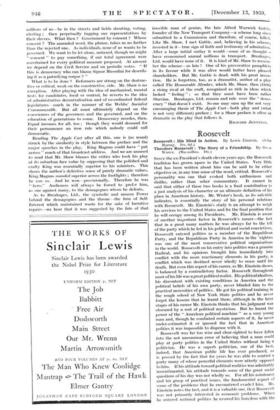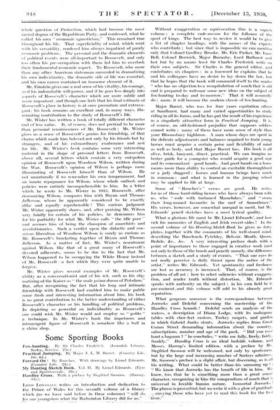Roosevelt
SINCE the ex-President's death eleven years ago, the Roosevelt tradition has grown apace in the United States. Very little that has been written about him can be said to be either objective or, in any true sense of the word, critical. Roosevelt's personality was one that evoked both enthusiasm and dislike, rather than sober commentary. It cannot be said that either of these two books is a final contribution to a just analysis of his character or an ultimate definition of his place in American history. Mr. Wister's book, as its sub-title indicates, is essentially the story of his personal relations with Roosevelt. Mr. Einstein's study is an attempt to weigh his services to the United States and fix the final position that be will occupy among its Presidents. Mr. Einstein is aware of another important factor in Roosevelt's career—the fact that in a great many matters he was always far to the left of the party which Ile led in his political and social convictions. Roosevelt entered politics as a member of the Republican Party, and the Republican Party in America in the 'eighties was one of the most conservative political organisations in the world. Roosevelt on his entry into politics was a genuine Radical, and his opinions brought hint immediately into conflict with the more reactionary elements in his party, a conflict which was destined never wholly to cease until his death. But even this aspect of his career, as Mr. Einstein shows, is balanced by a contradictory factor. Roosevelt throughout most of his life was a great political realist. His political idealism, his discontent with existing conditions in America and the political beliefs of his own party, never blinded him to the practical necessities of politics. He got his political training in the rough school of New York State politics and he never forgot the lessons that he learnt there, although in the later stages of his career Mr. Einstein thinks that his judgment was obscured by a sort of political mysticism. But he learnt the power of the "American political machine" as a very young man and, though he combated certain aspects of it, he never under-estimated it or ignored the fact that in American politics it was impossible to dispense with it.
Roosevelt was far too wise and clear-sighted to have fallen into the not uncommon error of believing that a man could play at party polities in the United States without being a politician. Ile was a superb politician, one of the best, indeed, that American public life has ever produced, as is proved by the fact that for years he was able to control a party many of whose powerful elements were utterly opposed to him. If his attitude toward political realities was admirably unsentimental, his attitude towards some of the great social questions of his day was not wholly so. For all his astuteness and his grasp of practical issues, the fundamental aspect of some of the problems that he encountered evadei hint. Mr. Einstein notes the fact, and it is a valuable one, that Roosevelt was not primarily interested in economic problems. When he entered national politics he avowed his boredom with the
whole question or Protection, which had become the most sacred dogma of the Republican Party, and confessed, what he called. his own "economic agnosticism." This remained true throughout his life. That superficiality of mind, which went wit Ii his versatility, rendered I • always impatient of purely economic problems. The personal and the dramatic elements of political events were all-important to Roosevelt, and only too often his pre-occupation with them led him to overlook their fundamental economic aspect. To Roosevelt, who more than any other American statesman succeeded in dramatizing his own individuality, the dramatic side of life was essential, and his own career contained an immense element of it.
Mr. Einstein gives one a real sense of his vitality, his courage, his indomitable will-power, and if he goes less deeply into :■-lieets of Roosevelt's character which are more subtle and I. we important, and though one feels that his final estimate of oosevelt's place in history is at once premature and extrava- ni his book remains an excellent and, in many ways, illu- minating contribution to the study of Roosevelt's life.
Mr. Wister has written a book of totally different character and of less volute. It, of course, does not pretend to be more than personal reminiscences of Mr. Roosevelt ; Mr. Wister gives us a sense of Roosevelt's genius for friendship, of that charm which made him beloved not only I,y his friends but by strangers, and of his extraordinary exuberance and zest for life. Mr. Wister's book contains some very interesting material in the shape of personal letters front Roosevelt, above all, several letters which contain a very outspoken opinion of Roosevelt upon 'Woodrow Wilson, written during the Var. Roosevelt's opinion of Wilson is perhaps more illuminating of Roosevelt himself than of Wilson. He not unnaturally if we remember his own temperament, had an innate repugnance for Wilson, whose whole outlook and policies were entirely incomprehensible to him. In a letter which he wrote to Mr. Wister in 1915, Roosevelt. after denouncing Wilson. compares him with Bryan and Thomas Jefferson, whom he apparently considered to be exactly alike and equally reprehensible ! This curious judgment Mr. Wister apparently shares, and, after praising Mr. Wilson very faintly for certain of his policies, he denounces hint fur his partiality for what Mr. Wister calls " the idle poor " trial accuses I • of being the champion of anarchists and revolutionaries. Such a verdict upon the didactic and con- scious liberalism of Woodrow Wilson is surely as curious as Mr. Roosevelt's bracketing together of Bryan and Thomas Jefferson. As a matter of fact, Mr. Wister's resentment against Wilson, like that of a great many of Roosevelt's devoted adherents, seems to be due to the fact that Mr. %Vilson happened to be occupying the White House instead of Mr. Roosevelt--a fact which they were quite unable to forgive.
Mr. Wister gives several examples of Mr. Roosevelt's ability as a conversationist and of his wit, such as his stig- Ina t izing of the Kaiser as tile male prima donna of Potsdam." But, after recognizing the fact that his long and intimate friendship with Roosevelt had enabled him to make public sonic fresh and interesting information about him, his book is no great contribution to the better understanding of either Roosevelt's character or his handling of political problems. In depicting so powerful an individuality as Roosevelt's one could wish Mr. Wister would not employ so " polite " a technique. In Mr. Wister's book the impetuous and intransigent figure of Roosevelt is somehow like a bull in a china shop.















































 Previous page
Previous page